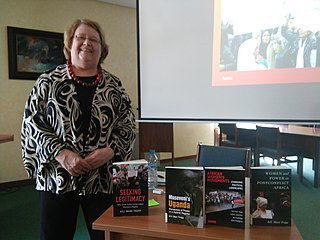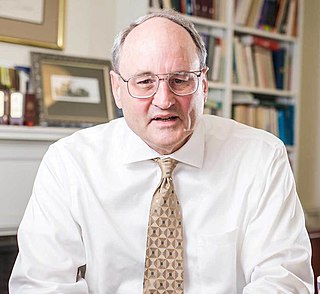Related Research Articles
Political science is the scientific study of politics. It is a social science dealing with systems of governance and power, and the analysis of political activities, political institutions, political thought and behavior, and associated constitutions and laws.

Thomas Sowell is an American economist, author, and social commentator who is a senior fellow at the Hoover Institution. With widely published commentary and books—and as a guest on TV and radio—he became a well-known voice in the American conservative movement as a prominent black conservative. He was a recipient of the National Humanities Medal from President George W. Bush in 2002.
William Julius Wilson is an American sociologist. He is a professor at Harvard University and author of works on urban sociology, race and class issues. Laureate of the National Medal of Science, he served as the 80th President of the American Sociological Association, was a member of numerous national boards and commissions. He identified the importance of neighborhood effects and demonstrated how limited employment opportunities and weakened institutional resources exacerbated poverty within American inner-city neighborhoods.

Patricia Hill Collins is an American academic specializing in race, class, and gender. She is a distinguished university professor of sociology emerita at the University of Maryland, College Park. She is also the former head of the Department of African-American Studies at the University of Cincinnati, and a past president of the American Sociological Association (ASA). Collins was the 100th president of the ASA and the first African-American woman to hold this position.

Glenn Cartman Loury is an American economist, academic, and author. He is the Merton P. Stoltz Professor of the Social Sciences and Professor of Economics at Brown University, where he has taught since 2005. At the age of 33, Loury became the first African American professor of economics at Harvard University to gain tenure.
Samuel J. Eldersveld was an American academic, political scientist, and Democratic politician. He served as Mayor of Ann Arbor, Michigan from 1957 to 1959.
Black nationalism is a type of racial nationalism or pan-nationalism which espouses the belief that black people are a race, and seeks to develop and maintain a black racial and national identity. Black nationalist activism revolves around the social, political, and economic empowerment of black communities and people, especially to resist their cultural assimilation into white culture, and maintain a distinct black identity.

Carol Miller Swain is an American historian and legal scholar who is a retired professor of political science and law at Vanderbilt University. A frequent television analyst, she is the author and editor of several books. Her interests include race relations, immigration, representation, evangelical politics, and the United States Constitution.

Aili Mari Tripp is a Finnish and American political scientist, currently the Wangari Maathai Professor of Political Science and Gender and Women's Studies at the University of Wisconsin-Madison.

Henry E. Brady is an American political scientist specializing in methodology and its application in a diverse array of political fields. He is Dean of the Goldman School of Public Policy at University of California, Berkeley and holds the Class of 1941 Monroe Deutsch Professor of Political Science and Public Policy. He was elected President of the American Political Science Association, 2009–2010, giving a presidential address entitled "The Art of Political Science: Spatial Diagrams as Iconic and Revelatory." He has published academic works on diverse topics, co-authoring with colleagues at a variety of institutions and ranks, as well as many solo authored works. His principal areas of research are on political behavior in the United States, Canada, and the former Soviet Union, public policy and methodological work on scaling and dimensional analysis. When he became President of the American Political Science Association, a number of his colleagues and co-authors contributed to his presidential biography entitled "Henry Brady, Big Scientist," discussing his work and the fields to which he has contributed and has also shaped.
Lucius Jefferson Barker was an American political scientist. He was the Edna Fischel Gellhorn Professor and chair of the political science department at Washington University in St. Louis, and then the William Bennett Munro Professor of Political Science at Stanford University. He was an influential scholar of constitutional law and civil liberties, as well as race and ethnic politics in the United States. He published works on civil liberties in the United States and systemic racism. He was also involved with several presidential campaigns, and he wrote books about the Jesse Jackson 1984 presidential campaign, for which he was a convention delegate.
Vanessa Catherine Tyson is an American political scientist and politician. She is an associate professor of politics at Scripps College and a political science fellow at Stanford University. Tyson was an unsuccessful candidate for California's 57th State Assembly district in the 2020 election, finishing in fifth place with 8.6% of the vote in the nonpartisan primary.
Political cognition refers to the study of how individuals come to understand the political world, and how this understanding leads to political behavior. Some of the processes studied under the umbrella of political cognition include attention, interpretation, judgment, and memory. Most of the advancements in the area have been made by scholars in the fields of social psychology, political science, and communication studies.
Sharon Wright Austin is an American political scientist, currently a professor of political science at the University of Florida, where she was also a longtime Director of the African-American Studies Program. Austin is a prominent scholar of American politics with specialties in African-American studies, political participation, and both urban and rural local politics.
Hanes Walton Jr. was an American political scientist and professor of African-American studies who pioneered the study of race in American politics. He was an early advocate for the creation of African-American politics as a subfield of political science, and he has been credited with developing the scientific study of Black politics. Walton published dozens of books and more than 100 journal articles or book chapters, investigating topics like African-American political participation and representation, Black conservatism, political parties in the United States, and the American presidency.
Marion E. Orr is an American political scientist, currently the Frederick Lippitt Professor of Public Policy and a professor of political science and urban studies at Brown University. Orr specializes in education reform in the United States, urban politics, Latino politics, and African-American politics.
Michael Hanchard, often published as Michael G. Hanchard, is an American political scientist, currently the Gustave C. Kuemmerle Professor of Africana Studies at the University of Pennsylvania. He is also the director of the Marginalized Populations Project there. He studies comparative politics and political theory, focusing on understanding the causes and consequences of nationalism and xenophobia, particularly within democracies.
Mae Coates King was an American political scientist. She was a professor of political science at Howard University, and a professor emerita as of 2017. She conducted early studies on the politics and international relations of African states, particularly the international relations of Nigeria, as well as research on the history of the Congressional Black Caucus and the status of African American women in American politics.
Michael K. Fauntroy is an American political scientist. He was formerly a professor in the political science department at Howard University, where he has also been the associate chair. In 2018 he became the acting director of the Ronald W. Walters Leadership and Public Policy Center at Howard University. He studies African American politics, interest groups, and American political parties and partisanship. In 2021, he takes on a new role at George Mason University where he previously spent 11 years at prior to Howard. He has published books on the struggle for self-governance in Washington, D.C., and the relationship between African American voters and the Republican Party.
References
- 1 2 "John D. MacArthur Professor of Political Science and the College". University of Chicago. Retrieved 9 February 2020.
- 1 2 3 "Michael Dawson– 2017 Hanes Walton Award Recipient". Political Science Now. American Political Science Association. 19 July 2017. Retrieved 9 February 2020.
- 1 2 3 Walton Jr., Hanes (1995). "Review Behind the Mule: Race and Class in African-American Politics". The Black Scholar. 25 (1): 48–51. doi:10.1080/00064246.1995.11430703.
- 1 2 Miller, Joshua (September 2014). "Reviewed Work: Blacks in and out of the Left by Michael C. Dawson". Perspectives on Politics. 12 (3): 731–732. doi:10.1017/S153759271400187X. S2CID 146885709.
- 1 2 Smith, Magdalena; Suh, Hyeji (16 October 2018). "Leading Chicago Political Scientist Michael Dawson Discusses the Politics of Reparations, Racial Justice". The Cornell Daily Sun. Retrieved 9 February 2020.
- 1 2 "American Academy of Arts & Sciences Accolades". University of Chicago. 2019. Retrieved 9 February 2020.
- ↑ "About This Author Michael C. Dawson". Boston Review. Retrieved 9 February 2020.
- ↑ Dawson, Michael C. (22 October 2014). "Washington Must Redress State Injustice". The New York Times. Retrieved 9 February 2020.
- ↑ Dawson, Michael C. (18 October 2012). "Most Americans Are Working Harder, and Earning Less". The New York Times. Retrieved 9 February 2020.
- ↑ Johnson, Theodore R. (31 May 2019). "Why do black voters support Biden? They just want to beat Trump". The Washington Post. Retrieved 9 February 2020.
- ↑ McFadden, James (24 January 2020). "The Business Party Syndicate". The Berkeley Daily Planet. Retrieved 9 February 2020.